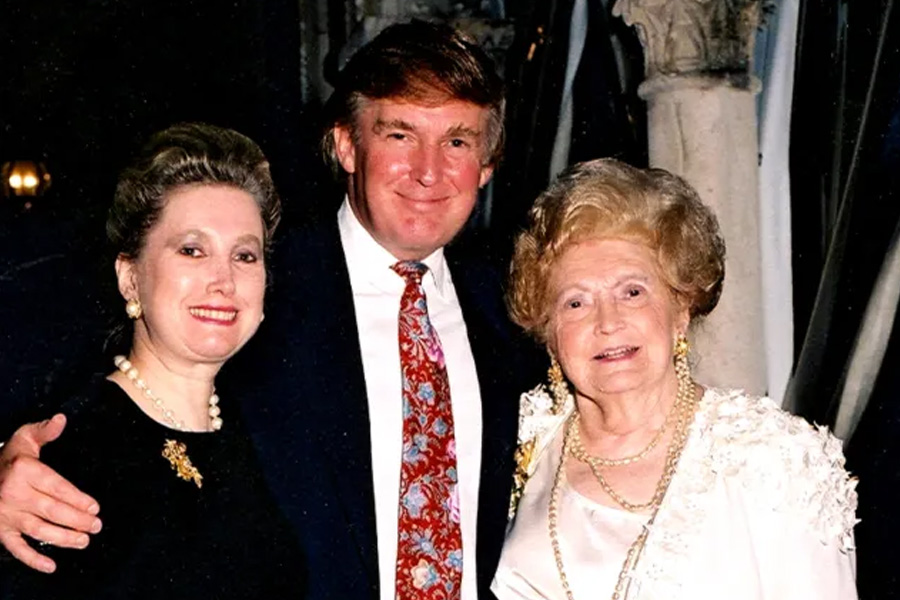Basic Information
| Attribute | Details |
|---|---|
| Full Name | Elizabeth Trump Walters |
| Birth Date | April 30, 1904 |
| Birth Place | Bronx, New York |
| Death Date | December 3, 1961 |
| Death Place | Manhattan, New York |
| Age at Death | 57 |
| Spouse | Otto William Walter (married June 16, 1929) |
| Children | Two sons: William Trump Walter (1931–2020), John Whitney Walter (1934–2018) |
| Parents | Frederick Trump (1869–1918), Elizabeth Christ Trump (1880–1966) |
| Siblings | Fred Trump (1905–1999), John G. Trump (1907–1985) |
| Notable Relations | Aunt to Donald J. Trump (born 1946), Maryanne Trump Barry (1937–2023), and others |
Early Life and Roots in a Growing Empire
Picture this: It’s 1904, and little Elizabeth enters the world in the Bronx, the firstborn in a family of German immigrants chasing the American Dream. Her father, Frederick, had crossed the Atlantic in 1885, dodging the draft back home and striking gold—literally—in the Yukon before settling into real estate in New York. But tragedy strikes early; Frederick dies in 1918 at just 49 from the Spanish flu, leaving Elizabeth, then 14, her mother, and two younger brothers to navigate a world without him. Her mother, the formidable Elizabeth Christ Trump, steps up like a boss—founding Elizabeth Trump & Son in 1927, a company that would balloon into a real estate powerhouse worth millions by the time Fred takes the reins.
Growing up amid anti-German sentiment during World War I, Elizabeth’s childhood feels like a scene from “The Immigrant”—whispers of prejudice, a family reinventing itself as proudly American. Baptized on May 22, 1904, in New York City, she embodies that era’s blend of old-world traditions and new-world hustle. By her teens, she’s already pitching in, perhaps bookkeeping for her brother’s budding ventures, a quiet contributor to what would become a dynasty valued at $250–300 million by 1999. It’s these early years that shape her—resilient, family-focused, the kind of person who’d rather build bridges than burn them.
Marriage and Family Life: Building Her Own Branch
Fast-forward to June 16, 1929—Elizabeth ties the knot with Otto William Walter in Jamaica, Queens, a match that feels straight out of a classic rom-com, complete with the charm of a simpler time. Otto, born in 1893, brings stability; together, they settle in Queens, raising two boys in a home filled with the aromas of home-cooked meals and the sounds of family gatherings. Their eldest, William Trump Walter, arrives in 1931, followed by John Whitney Walter in 1934—sons who’d carry forward the family lore, with John even becoming the unofficial historian, sharing records that later fueled investigative deep dives into the Trumps’ financial world.
Life for Elizabeth revolves around this nucleus—think of her as the Rose Kennedy of the Trump clan, nurturing ties that extend to her siblings’ kids. As aunt to Maryanne Trump Barry (born 1937, who climbs to federal judge status), Fred Trump Jr. (1938–1981, the pilot with a tragic story), Elizabeth Trump Grau (born 1942, the banker married to James Walter Grau), Donald J. Trump (born 1946, the mogul-turned-president), and Robert Trump (1948–2020, the business exec), she’s the connective tissue. Holidays in Queens? Likely filled with rhythmic lists of laughter, debates over real estate deals, and stories of their immigrant roots. Otto passes in 1959 at 66, leaving Elizabeth to face her final years alone, but surrounded by a web of relatives—her mother outlives her by five years, dying in 1966 at 85.
Her domestic flair shines through in unexpected ways. In the 1940s, she contributes to a community cookbook in Jamaica, Queens—recipes like “Mrs. William O. Walter’s Chocolate Cake” and “Corn Pudding” that evoke cozy kitchens and shared secrets. It’s these touches that humanize her, turning a historical figure into someone you’d want at your dinner table, dishing out wisdom with a side of dessert.
Career Glimpses and a Life of Support
While her brothers—Fred, amassing a fortune through housing developments for the middle class, and John G., pioneering in high-voltage physics—chase spotlights, Elizabeth’s path is subtler, more behind-the-scenes. No flashy titles here; she dips into the family business early on, bookkeeping for Fred in the 1920s and ’30s, helping crunch numbers that build over 27,000 apartments across New York by the time Fred dies in 1999. It’s not glamourous, but crucial—like the bass line in a jazz ensemble, steady and essential.
Her “career,” if we can call it that, mirrors many women of her generation: homemaker first, supporter always. Yet, in those ledgers and family ledgers alike, she leaves an imprint. No net worth figures for her personally— she departs in 1961 after a long illness, before the family’s wealth explodes—but her legacy? Priceless, in the bonds she fosters. Imagine her as the quiet producer in a blockbuster family drama, ensuring the script runs smooth.
The Extended Family: A Tapestry of Triumphs and Trials
Diving deeper into the branches, Elizabeth’s siblings paint a vivid picture. Fred Trump, born 1905, transforms their mother’s company into a behemoth, facing controversies like a 1927 KKK rally arrest (though charges dropped) and later housing discrimination suits in the 1970s. He fathers five kids, each carving paths: Maryanne, the trailblazing judge retiring in 2019 amid ethics probes; Fred Jr., whose alcoholism leads to an early death at 42, a heartbreaking subplot; Elizabeth Grau, keeping a lower profile in banking; Donald, whose 2016–2020 presidency needs no recap—love him or debate him, he’s the family’s lightning rod; and Robert, the loyal exec passing in 2020 at 71.
Then there’s brother John G. Trump, the scientist born 1907, MIT prof by 1936, wartime radar wizard, and high-voltage guru—think Tony Stark without the ego, co-founding a company in 1946 that pushes boundaries in physics. He dies in 1985 at 77, childless but uncle to the next gen.
Elizabeth’s sons add layers: William, living to 89; John, the historian who in 2018 provides docs for a New York Times exposé on family finances, revealing strategies that saved millions in taxes. It’s a family saga rife with ambition, loss, and that insider vibe—whispers of wealth, power plays, and the immigrant grit that started it all in 1885.
FAQ
Who was Elizabeth Trump Walters’ husband, and when did they marry?
Elizabeth married Otto William Walter on June 16, 1929, in Jamaica, Queens; he worked in various roles and passed away in 1959 at age 66.
What were the names and birth years of her children?
She had two sons: William Trump Walter, born in 1931 and died in 2020, and John Whitney Walter, born in 1934 and died in 2018, who later served as the family historian.
How was Elizabeth related to Donald Trump?
Elizabeth was Donald Trump’s aunt, as the sister of his father, Fred Trump; she connected the early immigrant roots to the modern dynasty.
What role did she play in the family business?
She assisted as a bookkeeper for her brother Fred in his early real estate ventures during the 1920s and 1930s, providing quiet support to the growing empire.
When and where did Elizabeth Trump Walters pass away?
She died on December 3, 1961, in Manhattan, New York, at age 57 after a long illness, survived by her sons, mother, and brothers.
What were some glimpses into her personal life?
Elizabeth contributed recipes to a 1940s community cookbook, showcasing her domestic side with dishes like chocolate cake and corn pudding, reflecting her engaged community role in Queens.
Who were her parents, and what was their background?
Her parents were Frederick Trump (1869–1918), a German immigrant and early real estate developer, and Elizabeth Christ Trump (1880–1966), who founded the family business after her husband’s death from the Spanish flu.
How many siblings did she have, and what did they achieve?
Elizabeth had two brothers: Fred Trump (1905–1999), who built a massive real estate portfolio, and John G. Trump (1907–1985), a renowned scientist in high-voltage physics.
What was the estimated value of the Trump family estate later on?
By Fred Trump’s death in 1999, the family estate was valued at $250–300 million, though Elizabeth’s personal finances remain undocumented as she predeceased this peak.
Were there any notable stories or mentions of her in media?
She appears in family narratives highlighting immigrant origins and business beginnings, like in discussions of their German roots and early 20th-century life, though without major scandals.



